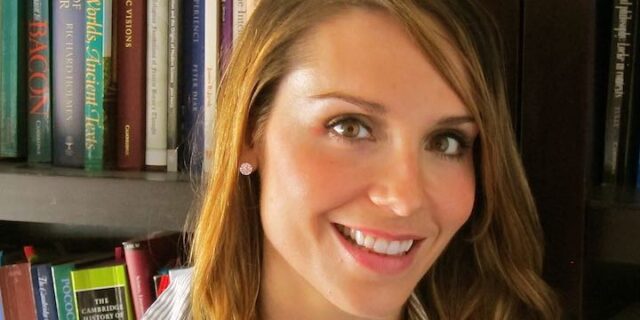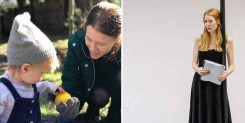We all know that churches in the first world have lost numbers over the past century, with many people leaving the faith of their parents to become atheists, agnostics, vague theists, believers in other religions, or just indifferent. We may not always be so aware of a number of people making the journey in the opposite direction, from unbelief to faith. Some studies suggest that highly educated people may be more likely to convert.
This is a story of one such convert. It is all the more interesting because her conversion came out of considering one of several significant philosophical difficulties for atheism.
Sarah Irving-Stonebraker, this was your life
Sarah must have been highly intelligent from her childhood, because at age 8 she says she knew she wanted to study History at Cambridge University. Growing up in a secular family in Australia, she arrived at Sydney University as a secular humanist. She knew who she was, what her values were and what she wanted to be, and none of that required faith, it was based on “self-evident truths”.
She won the University medal and a scholarship to Cambridge to study for her PhD, and entered Kings College believing “Christians were anti-intellectual and self-righteous”.
After completing her PhD, she began research at Oxford University, where she had the opportunity to attend several lectures by Aussie philosopher and atheist Peter Singer.
Peter Singer and human value
Peter Singer is a most interesting man, with a number of endearing qualities (e.g. he donates a quarter of his income to alleviate extreme poverty) and a number of challenging moral viewpoints (e.g. he argues that infanticide can be morally acceptable under certain circumstances).
The challenging viewpoints arise from considering how human beings differ from animals, and how we can determine moral values.
Moral values
It is difficult for an atheist like Singer to establish any reasonable basis for moral values. Evolution may give us moral feelings, but sometimes we know instinctively that we shouldn’t always follow those feelings – e.g if they lead to genocide to protect “our” tribe and our genes.
But where does that instinctive feeling that genocide or pedophilia are “wrong” come from? It may be a natural feeling, but why follow it? Singer bases his ethics on utilitarianism, the belief that we “should” call actions moral if they produce the greatest good for the greatest number of people. He has admitted that there are philosophical and practical difficulties with this view, because it has no real basis in any observable truth.
Humans and animals
His utilitarianism also leads him to the judgment that an adult chimpanzee may be more of a “person” (i.e. a being with desires for the future) than a new born baby, hence the view that leads to the possibility of infanticide, for example, if the baby is disabled.
Sarah and Peter Singer
Sarah was a secular humanist when she attended Singer’s lectures, that is, she believed that humans had great value or worth. But Singer’s lectures helped her realise that “human equality is not a self-evident truth”.
I began to realise that the implications of my atheism were incompatible with almost every value I held dear.
Many atheists come to this point and decide they can live with their high moral values being simply subjective, either their own personal choice or the way their genetics and upbringing have led them to think. This view doesn’t really give a logical basis for the strength with which they hold to ethics like the value of human life, but there doesn’t seem to be another way for an ethical atheist to go.
But Sarah chose a different path.
Sarah and God
She began to read a little philosophical theology, and could see that theism supplies some basis for true ethics that her atheism couldn’t. But she wasn’t convinced. Perhaps there was a God, but perhaps not. She was moving from atheism to agnosticism, but she knew that agnosticism also provided no basis for her strong moral feelings and values.
On the basis of this intellectual reasoning that pointed to God, Sarah began to observe the actions of christians where she was now working as an Assistant Professor in Florida. She saw christians “feeding the homeless every week, running community centres, and housing and advocating for migrant farm laborers”, all motivated by their faith.
She knew she needed to resolve this dilemma. She “walked into a church for the first time as someone earnestly seeking God” and felt overwhelmed. She read ( why am I surprised?) CS Lewis’ Mere Christianity, which addresses the source of moral feelings, and apparently found three different strands coming together – the intellectual (courtesy of Singer and Lewis), the way she saw ethics being lived out by christians, and her spiritual experience of being overwhelmed by the love of God.
Take a step, learn to walk
So she took the step, “I knelt in my closet in my apartment and asked Jesus to save me, and to become the Lord of my life.” And having taken that step, she began to read theologians who could help her explore her new belief. And she was surprised to learn two things about christian belief.
Christianity is not an unthinking faith. Doubt is OK. God wants us, she came to believe, to wrestle with him and to struggle through “doubt and faith, sorrow and hope”.
Christianity is radical. It is unlike other religions: “In becoming fully human in Jesus, God behaved decidedly unlike a god.” His “sacrificial love is utterly opposed to the individualism, consumerism, exploitation, and objectification, of our culture”.
And she found that being a christian means being part of the radical new creation God is bringing into the world, “transforming this broken, unjust world”. We have work to do. We are called to serve.
Next steps
Sarah has now returned to Australia and taken up a position at a University in Sydney. You can read her account of her story in The Veritas Forum.
This page was originally published as a post, but has now been moved here.
Photo: University of Western Sydney via The Veritas Forum
You may also like these
Feedback on this page
Comment on this topic or leave a note on the Guest book to let me know you’ve visited.




